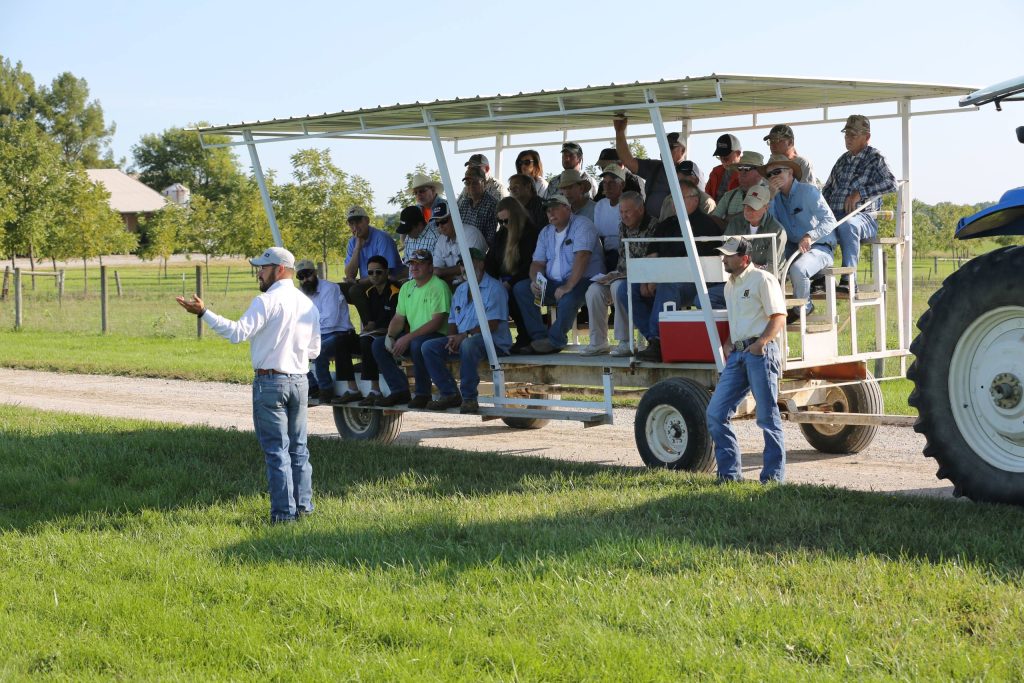Published on
Updated on
Restructured experiment station centers focused on sharing agricultural advances with Missouri farmers and ranchers
Written by Logan Jackson · Photography by Logan Jackson · July 7, 2022

The Missouri Agricultural Experiment Station (MOAES) includes research farms throughout the state and enjoys a storied history of major impacts by advancing the science in agriculture, food and natural resources — on a local, national and global stage. These University of Missouri College of Agriculture, Food and Natural Resources (CAFNR) outdoor laboratories provide research faculty with a wide variety of real-world conditions to test and develop strategies for advancing agricultural production and technologies, based on the geographical and climatic differences in Missouri.
To allow the MOAES to build on its successes, the CAFNR leadership team spent more than two years studying the needs and challenges facing the research farms in an effort to improve all of the operations and functions of the MOAES.
“We collected information from internal and external stakeholders, including critical feedback from an external review committee of research center leaders and others,” said Shibu Jose, CAFNR associate dean for research and director of the MOAES.
A task force, led by Marshall Stewart, vice chancellor for Extension and engagement at Mizzou, considered the collected information and put together a series of recommendations in a report titled, Moving AES Forward. The CAFNR leadership team began implementing those recommendations last August. As of May 1, the restructured experiment station network is complete. The new system better aligns the MOAES with the strategic priorities of CAFNR and MU, as well as creating financial flexibility for investments to keep MOAES at the forefront of basic, applied and translational research.
The most important change was the consolidation of the research farms into four Research, Extension and Education Centers (REECs), each with its own director. The Research Center moniker has been dropped, with two former Centers turned into REECs – the Southwest REEC and the T.E. “Jake” Fisher Delta REEC. The Lee Greenley Jr. Memorial Research Farm, Cornett Research Farm (formerly Forage Systems) and Thompson Research Farm make up the Northern Missouri REEC. Multiple central Missouri properties, including Baskett Forest; Bradford Research Farm; Beef Farm; Foremost Dairy; Horticulture and Agroforestry Research Farm; Land of the Osages Research Farm; Sanborn Field; and South Farm, are now part of the Central Missouri REEC.
Four properties – Graves-Chapple, Hundley-Whaley, Wurdack, and Jefferson Farm and Garden – have been reclassified as Extension and Education Centers and are now operated by MU Extension.
“Our main focus is moving forward as a unified MOAES,” Jose said. “Like with any change, there is going to be a period of fine-tuning. However, one thing remains unchanged; we will be driven by our mission, which is to conduct unbiased agricultural research and share that knowledge with our stakeholders.”
Jay Chism, Aaron Brandt and Jeff Case serve as directors of the Southwest REEC, Fisher Delta REEC and Northern Missouri REEC, respectively. Dusty Walter is the director of the Central Missouri REEC, and is joined by three assistant directors due to the size and complexity of the REEC. Tim Reinbott is assistant director for natural resources, Andrew Biggs serves as assistant director for crops and Bryon Wiegand is interim assistant director for livestock.
“It’s great to have the leadership team in place,” Jose said. “There is a bit of a different leadership philosophy and expectation with our four directors. We really want them to be visionary leaders who will help drive the MOAES to distinction.”
The individual farms still have on-site leadership as well, in the form of farm managers or senior farm managers, who handle the day-to-day operations. Also, while each research farm continues to have an advisory board, the individual REECs have also developed their own advisory boards.
Jose added that a major focus of the REECs and their leaders will be on making meaningful connections with the communities in their specific regions. In addition to a newly launched monthly newsletter for each REEC, they will continue to offer field days, farm tours, workshops and career exploration days. Each REEC will also have an active presence on social media.
Traditional field days will continue, too. For example, the Fisher Delta REEC will host its appreciation breakfast, tour and lunch on Friday, Aug. 26. The Northern Missouri REEC Field Day will take place at the Greenley Research Farm on Tuesday, Aug. 30. The Missouri Chestnut Roast will be held on Saturday, Oct. 1, at the Horticulture and Agroforestry Research Farm.
“We are planning most of the traditional field days again this year, but there is still much discussion taking place on the best ways for each REEC to connect with its stakeholders,” Jose said. “We’re looking at providing multiple workshops, as well as more topic-specific field day offerings. We’re early in the process and still working through our plan, but I’m very excited for the future of the MOAES.”